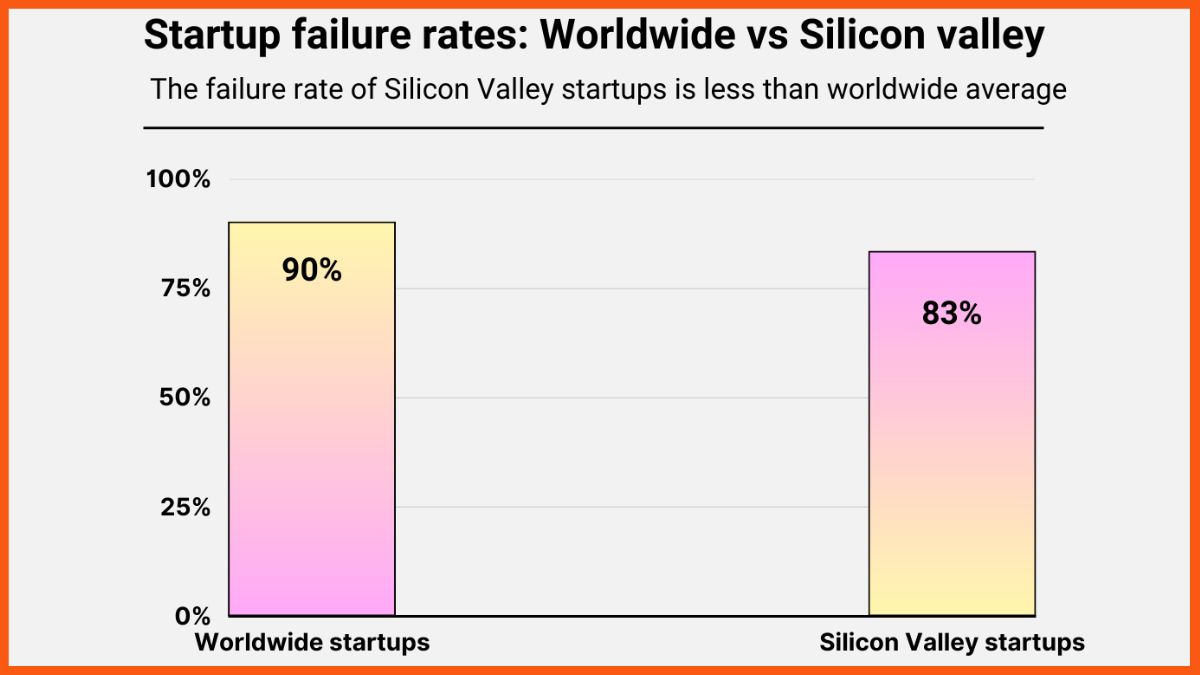Startup Failure and Success Rates: Research Report
🔍Insights
We spent days researching the latest statistics on startup failure and success rates.
Our research process includes interviewing startup founders, studying research papers, publicly available government data on the startup economy, and more.
As a result, we have created this up-to-date list of 30+ statistics covering topics like:
- Startup Failure Rates
- Startup Success Rates
- Startup Success and Failure Rates in India
- Startup Statistics
- Startup Costs and Funding Statistics
- Y Combinator Startup Statistics
Startup Success Advice From Real Founders
Let’s dive into the results.
Key Insights From the Report (Editor’s Choices)
- Almost 90% of startups fail.
- The information industry has the highest failure rate at 63%.
- 27% of male-led startups successfully exit the VC as compared to 17% of women-led startups.
- Female-owned startups receive only 2.3% of VC funding.
- Cryptocurrency and digital healthcare startups have the highest failure rates at 95% and 98%, respectively.
- 33% of startups survive 10 years of operation.
- A startup founder with a successful venture in the past has a 30% chance of success.
- The USA is home to the most number of startups, at 74,623, and more than 50% of all unicorns are located there.
- 80% of startups in India fail within 5 years.
- $3000 is the average cost of starting a small business.
- 75% of startups backed by VC funding fail.
- Fintech is the dominating industry, as 7.1% of all global startups fall in this category, with a market size of $310 billion.
- The Y Combinator failure rate is 20%, but it is subjected to various factors.
Startup Failure Rates
Most startups fail. However, we wanted to go in-depth and understand why startups fail and how one can improve their chances of success. We analyzed startup failure rates among various industries and also tried to understand the primary reasons.
Let’s start with the major question first.
What is the Failure Rate of Startup Companies?
The failure rate for new startups is around 90%. It means only 1 out of 10 startups survive. This failure rate is similar across all industries. Almost 90% of startups survive the first year. However, 70% of them fail within the next five years.
The number one reason why most startups fail is due to misinterpreting market demand. 34% of startups fall in this category of not achieving product-market fit.
What Industry Has the Highest Failure Rate for Startups?
As the failure rate among all industries is close to 90%, we took a different approach to create distinction. The data below shows the failure rate of startups after staying operational for four years or more.
The information industry tops the list with a 63% failure rate. It seems a little surprising at first, but the information industry has a low barrier to entry and consists of many high-risk startups.
Here are the startup failure rates by industry:

- Transportation and utility industry has a failure rate of 55%.
- Retail and construction industry tied for the third spot with a failure rate of 53%.
- 51% of startups in the manufacturing industry fail.
- Next are the mining and wholesale industries, with 49% and 46% failure rates, respectively.
- The service industry has a failure rate of 45%.
- Education & Health and the Agriculture industry have the same failure rate of 44%.
- The Finance & Real Estate industry has the lowest failure rate at 42%.
This data indicates that half of the startups in every industry fail after 4 years of operation.
What Percentage of Tech Startups Fail?
The tech industry has the highest failure rate among all industries at around 63%. Factors responsible for the high failure rate in the tech sector are high investment costs, constantly evolving technologies and intense competition.
Healthcare Startup Failure Rate
The digital healthcare startup failure rate is 98%, which is higher than the industry average of 90%. 51% of digital healthcare startups fail within the first 2 years of launching.
It’s estimated that 75% of US-based medical device startups fail. The healthcare sector is challenged with strict regulations and fewer pivoting out opportunities.
What is the Failure Rate of Biotech Startups?
Only 10% of biotech startups that enter clinical trials survive. The medical device startup failure rate is 90%.
The most common reason for their failure is flawed science. There are also other reasons for failure, like lack of capital and an ever-changing market.
Silicon Valley Startup Failure Rate

Silicon Valley startups are more sustainable as their failure rate is 83%. It may not look good, but it’s still 7% lower than the worldwide average.
Male vs. Female Startup Failure Rate

27% of male-led startups successfully exit VC financing. However, only 17% of women-led startups do the same. As compared to male-led startups, 37% fewer female-led startups became successful. It is much worse in terms of performance, considering 53% of startups have a female executive.
One of the biggest reasons for the failure of female-led startups is the lack of VC funding. It was estimated earlier that only 2.3% of VC funding is received by startups owned by females.
What Percentage of Crypto Projects Fail?
The failure rate of crypto and blockchain startups is higher than the average, as 95% of such endeavors end in failure. In fact, the average lifespan of a blockchain startup is just one year.
One of the biggest reasons why most blockchain or cryptocurrency startups fail is that they take a long time to build. There are other reasons for failure, such as high competition and a lack of regulation.
What are the Statistics on Restaurant Failures?
According to the National Restaurant Association, 60% of restaurants fail in the first year, one of the highest among industries. After five years of operation, the overall failure rate for restaurants is 80%, resulting in 20% of restaurants eventually succeeding.
Venture Capital Startup Failure Rate

About 30% of VC-funded startups fail eventually. On average, a venture capital firm receives 1,000 proposals every year.
Currently, AI & Big data comprise 24% of all VC-funded startups worldwide. Healthcare, Manufacturing, and FinTech come in second with 10% of startups each. 60% of entrepreneurs have faith in AI and believe it is the most promising technology at the moment.

Startup Success Rates
The startup success rate can easily be measured if one already knows the startup failure rate. However, we wanted to go more in-depth to understand which countries have the highest success rates for startups.
We analyzed data from various sources and realized that having more startups does not automatically equate to having better success rates.
Let’s go through the findings to understand them better.
What is the Real Startup Success Rate?

As the average startup failure rate is 90%, it’s safe to say that the average startup success rate is approximately 10%. This is consistent across all industries, with a few exceptions. For instance, the Gaming industry has a 50% success rate, the highest among all others.
Around 33% of all startups make it to the 10-year mark. With a 1 out of 10 success ratio, surviving 10 years by 1 out of 3 startups is a big achievement.
Are Second-Time Founders More Likely to Succeed?
Yes, the second time founders are more likely to succeed as shown in the data below.
A first-time small business owner has an 18% chance of succeeding in their venture.
On the other hand, a founder with a failed venture in the past has a success rate of 20%. Chances of success increase with experience, even if a founder’s first venture failed.
A founder with a successful business in the past has a 30% chance to succeed in their new venture. Now, it may not indicate that there is a formula for success. However, it does reflect that success can be replicated by following certain rules and processes that successful founders understand.
Having partners involved in a startup also increases its chances of success to 30% as a result of more investment, growth rate, and experience.
Which Country Has the Most Startups in 2023?

The USA has the most number of startups in the world, with an approximate number of 74,263. India comes second with 15,246 startups. Even though India comes second, the US has about five times more startups as compared to them. In third place, we have the UK with 6,801 startups.
Startup Success Rate by Country

Switzerland, the UK, Hong Kong, and Singapore have the highest startup success rate. On the other hand, countries with the highest failure rates are the US, Canada, France, and South Africa.
Switzerland has a success rate of about 35%, which is about 2.5 times more compared to South Africa.
South Africa has the lowest startup success rate at about 15%.
The US is home to most startups, yet it has one of the lowest startup success rates.
What is America's Startup Success Rate?

The startup success rate in the US is around 20%, double the industry average. The USA has 50% of all unicorns, making it home to the most number of unicorns in the world.
California is the most successful state in the US in terms of achieving quick startup success. It takes an average of 7.1 years to achieve startup success in California. New York comes second by a slight margin, and Massachusetts is in the third spot.
IT Startup Success Rate in the USA
The technology startup success rate in the US is 33%. The USA boasts one of the most significant tech markets in the world at a valuation of $1.6 trillion.
Every year 20 new tech startups in the US go on to make $100 million in revenue. Tech startups also pay double the average wage in the US at an average of $102,000.
Startup Success and Failure Rates in India
India is the country with the second-highest number of startups globally. We analyzed the success and failure rates of startups in India by going through various sources.
We found some interesting data, such as how the number of recognized startups in India increased exponentially. Let’s look at the data we found.
Are Startups in India a Success or Failure?
80% of startups in India never make it past 5 years. As per calculations, approximately 1,27,000 startups fail every day in India.
The startup success rate in India is still higher than the global average.

In 2016, India only had 452 recognized startups. However, that number skyrocketed to 84,012 in 2022, an 18,586% growth.
How Many Successful Startups Are There in India?
India boasts 115 unicorn startups with a combined valuation of about $350 billion. It ranks third as the country with the most number of unicorns after the US (661) and China (362).
Startups in India take an average of 8 years to go public. During the first two years, the majority of startups are funded by friends and family. In their 6th year of operation, they receive VC backing.

Startup Statistics
This section focused on understanding the latest trends and statistics around startups globally. We tried to understand why startups performed well in some industries and not in others.
We wanted to understand the major reasons behind such a high failure rate among startups. We have analyzed multiple publishers and verified our data from many sources before presenting this fact.
Which Industry Has the Most Startups?
Startups across the world gravitate more towards technological fields. 7.1% of all global startups are in the fintech industry. 6.8% are in healthcare and life sciences, whereas 5% deal in AI.
Gaming also has a big chunk of the market share at 4.7%. Adtech and Edtech comprise 3.3% and 2.8%, respectively.
As of now, ByteDance (parent company of TikTok) is the highest-valued private startup in the world, with a valuation of $225 billion. SpaceX comes second with a valuation of $137, and Shein takes third place at $100 billion.

The top 3 highest-valued startups are the only ones with a valuation of more than or equal to $100 billion.
What Are the Startup Statistics for 2023?
305 million startups are incorporated globally every year. Early-stage startups require three times more time to achieve the product-market fit.
Almost no startup is profitable in the first year of business. In fact, only 40% of all startups become profitable when they are operational. 30% of them never make a profit and are constantly at a loss. However, the remaining 30% just break even or fail.

99% of businesses in the US are considered small as they have less than 500 employees. 70% of the US startups start from the home instead of an office.
Why Do 90% of Startups Fail?

The number one reason startups fail is due to the lack of product-market fit. Around 32% of startups fail due to this reason.
Marketing and team problems come close at 22% and 18%, respectively. Only 16% of startups fail due to financial issues.
What is the Success Rate of Tech Startups?
In the long run, the success rate of tech startups is 10%, similar to the global average.
The U.S. is the largest tech market in the world, with a market size of $1.6 trillion. However, the tech market has the highest failure rate among all sectors at 63%.
The average age of a tech startup founder is 45 globally, while in the US, it’s 39.
Another interesting fact about the tech industry is that tech wage growth is 60.9% higher than the US wage growth. The tech industry offers an average wage of $102,000 as compared to the US average of $48,000.
How Many Fintech Startups Are There in Total?

There are 26,393 fintech startups in the world. America tops the list as home to 44% of total fintech startups in the world, that is 11,651.
The global fintech industry was estimated to have a market size of $310 billion in 2022. The industry was backed by VC funding of $81 billion in 2022.
However, 75% of VC-backed fintech startups fail. 80% of financial institutions in the US have a partnership with a fintech service provider.
Currently, Ant Group is the largest fintech company in the world with a valuation of $131 billion.
Startup Costs and Funding Statistics
In this section, we answered the most frequently asked questions, such as the cost of starting a business. We have also reviewed multiple sources and publishers to find some insightful funding statistics as well.
This section is crucial if someone wants to invest in a startup or start one. It explains the average cost for startups in various industries and why a majority of them never become profitable.
How Much Does It Cost to Start a Business?
The average cost of starting a small business is $3,000. However, it varies depending on the industry.
Startups in online retail, accounting, landscaping, and construction require an average of $5,000 to set up.
The most expensive startups to launch are from the restaurant, healthcare, and manufacturing industries, which may cost more than $100,000.
Every startup requires specific equipment based on its industry and product/service. The lowest average equipment cost to start a small business comes close to $10,000.
Most startups do not hire an employee in the first 6 months. However, once they do, payroll is the highest startup cost. Startups may have to pay $300,500 for 5 employees on average.
Even after receiving investment, only 40% of startups become profitable. The biggest reason why startups never become profitable is cash flow problems. 82% of startups that do not become profitable are due to this issue.

Startup Failure Rate After Investment
On average, 35% of investors lose all of their initial investment in a startup. If we look at the startup failure rate after investment, 75% of venture capitalist-backed startups lose all their investors’ money.
The startup launch time has decreased globally. In 2003, launching a startup would take around 54 days. Today, most of the friction is removed, and a new business can be launched in as little as 20 days.

In 77% of startups, founders use personal funds to set up their ventures. In the long run, only 0.05% of businesses receive VC funding.
In the US, 58% of startups only require $25,000 to start. However, only 1 out of 100 startups that raise a seed round reach a valuation of $1 billion or higher.
Startups in the capital industry, like Uber and Airbnb, need more than $1 billion.
Y Combinator Startup Statistics
Y Combinator is one of the most famous startup accelerators in the world. They boast one of the lowest failure rates in the world.
To learn about their low failure rate, we reviewed multiple publishers and even visited Y Combinator sites to analyze the data they share.
Let’s see what we found.
How Many Startups Are Funded by Y Combinator?
More than 10,000 companies apply every six months to become a part of the Y Combinator accelerator program. However, the YC acceptance rate is 1.5-2%. So far, they have invested in more than 3,000 ventures and worked with over 6,000 founders.
What is the Success Rate of Y Combinator Funding?
Y Combinator has a portfolio of 110 companies with a valuation of more than $100 million and 25 businesses valued at over $1 billion.
In 2022, they released a list of their 271 most successful startups. Given this number and considering they have invested in more than 3,000 businesses, YC's startup success rate comes to around 9-10%.
What Percentage of YC Startups Fail?

YC has a failure rate of 20%. It seems impressive, considering the industry average is 90%. However, most companies in YC’s portfolio (more than 1500) were funded in the last 5 years and are too young to draw a conclusion.
In terms of industries, SaaS tops the list with a failure rate of around 30%. Next is the entertainment industry, with a failure rate of around 22%. You can see the failure rate of other industries in the image below.
Startup Success Advice From Real Founders
Here are some valuable insights and advice for startup success directly from experienced founders:
The power of grit, problem-solving, and perseverance
Insight from Nikhil Sharma, Co-Founder of LitmusEye.
“Success in the realm of startups hinges on two factors. One is the grit and determination of the founder or founders - the business landscape can be a tough playground, and sticking it out takes guts. The second one is solving a problem in a capital-efficient manner.
If you're not adding value or creating solutions, it's going to be tough. So, having a better way to address an existing problem, or being the first to tackle a new one, is critical.
The real value, however, lies in steadfast perseverance - it reaps rewards. Stick around long enough and success isn't just a possibility, it's an eventuality.”
Five Pillars for a Strong and Sustainable Business
Insight from Srikanth Acharya, Founder of OffiNeeds and TheHomeOffice.
Based on my 10+ years of entrepreneurial journey, here are five key factors that helped me build and scale my startup.
1. Solve Problems. Don't Sell
Instead of trying to sell your product or service, try to solve your customers’ real problems. This may include helping individuals/organizations to achieve their goals and helping them overcome challenges.
2. Not everyone is your customer
Create an Ideal Customer Profile. Only address them. Ignore the rest. Maybe they can't afford it, maybe they don't like your solution, or maybe you can't deliver to their location.
3. Spread the good word
Once you have identified the solution to a problem and you have identified the kind of people who need this solution, go ask out and let them know about it.
4. Don't remain self-employed
Identify your strengths and weaknesses. Do only what you love, what delivers the highest value. Build a team, create partnerships, or outsource everything else.
5. Sales solve all problems
Version one is way better than version none. Even if your product/service is not yet perfect (probably, it'll never be), sell it anyway. And keep improving.
Build a customer-obsessed startup to survive in the long run
Insight from Arbab Usmani, Co-founder of UppSkill Academy.
First, define what makes a startup successful. Put simply, if the startup is making money and is profitable, it is successful to some extent. Many founders make the mistake of focusing on vanity metrics instead of the end business goal which is to generate revenue.
Also, your first priority as a startup founder should be customer support and solving customers’ problems. Otherwise, it will be difficult for a startup to sustain itself in the long run.
A resilient founder is all it takes
Insight from Sivaraman S, Founder of Qikink.
Most of the founders are heavily relying on their products. If it fails, they fail too. That needn't be the case, they can pivot the product, change the addressable market, team, tech, etc. Being successful depends on how strong-willed and resilient the founding team is.
Opportunities and market gaps are abundant in a market like India to create a company and win big.
Final Takeaway
The 90% failure rate is not true in every case. There are certain industries with a 98% failure rate, while others, like gaming, have a 50% success rate.
The methodology also matters. To truly create a distinction among many industries, only the data from the first 5 years of operation is tested by multiple publishers. IT still tops the list with the highest failure rate.
India has seen one of the biggest rises in the number of recognized startups. India also has the third-highest number of unicorns.
The number one reason for startup failure is a lack of product-market fit. Every entrepreneur must try to focus on this factor first.
There is still a huge gap between VC funding received by men and women-owned startups. However, women-owned startups backed by VC funds do not perform as well as male-owned startups.
FAQs
What is the startup failure rate?
The startup failure rate is 90%, which is consistent among almost all industries.
Why do startups fail?
The biggest reason for startup failure is a lack of product-market fit. Other reasons include poor marketing, team, finance, and technical problems.
How many startups fail after 1 year?
10% of startups fail in their first year.
What percentage of Indian startups fail?
Almost 90% of Indian startups fail, similar to the global average.
How many startups survive 5 years?
More than 50% of startups fail in the first 5 years. It indicates that less than 50% of startups survive 5 years.
How many businesses fail within 2 years?
20% of businesses fail within the first two years of starting their operations.
What makes a startup successful?
To become successful, a startup must have a strong product and achieve product-market fit as soon as possible. Next, they must have a sound marketing strategy, a talented team, and a decent amount of funds to continue their operations.
How to measure startup success?
There are certain ways to measure a startup's success. Some common metrics to measure startup success are Revenue and Financial Performance, Market Valuation, Market Share, and Funding.
Where do most startups fail?
Around 34% of startups misread the market and do not achieve product-market fit. It is the biggest reason why most startups fail. Poor marketing and team problems are also two of the major reasons behind their failure.
Which qualities are most valuable in a startup?
The qualities that are most valuable in a startup are:
- Adaptability and Agility are the most significant qualities as the market and technology constantly change. Quick adaptations are required to sustain and survive.
- A strong and clear vision is required. The startup failure rate is 90%, and only startups that are strongly committed to their vision have a chance to succeed.
- Execution is essential to capture market share. Startups must prioritize tasks, set deadlines, and execute tasks effectively to achieve growth.
- Teamwork is also a valuable quality in a startup. The third major reason why most startups fail is the lack of proper teamwork. Everyone must work toward the same goals together and collaborate with each other to increase productivity.
Must have tools for startups - Recommended by StartupTalky
- Convert Visitors into Leads- SeizeLead
- Website Builder SquareSpace
- Run your business Smoothly Systeme.io
- Stock Images Shutterstock






